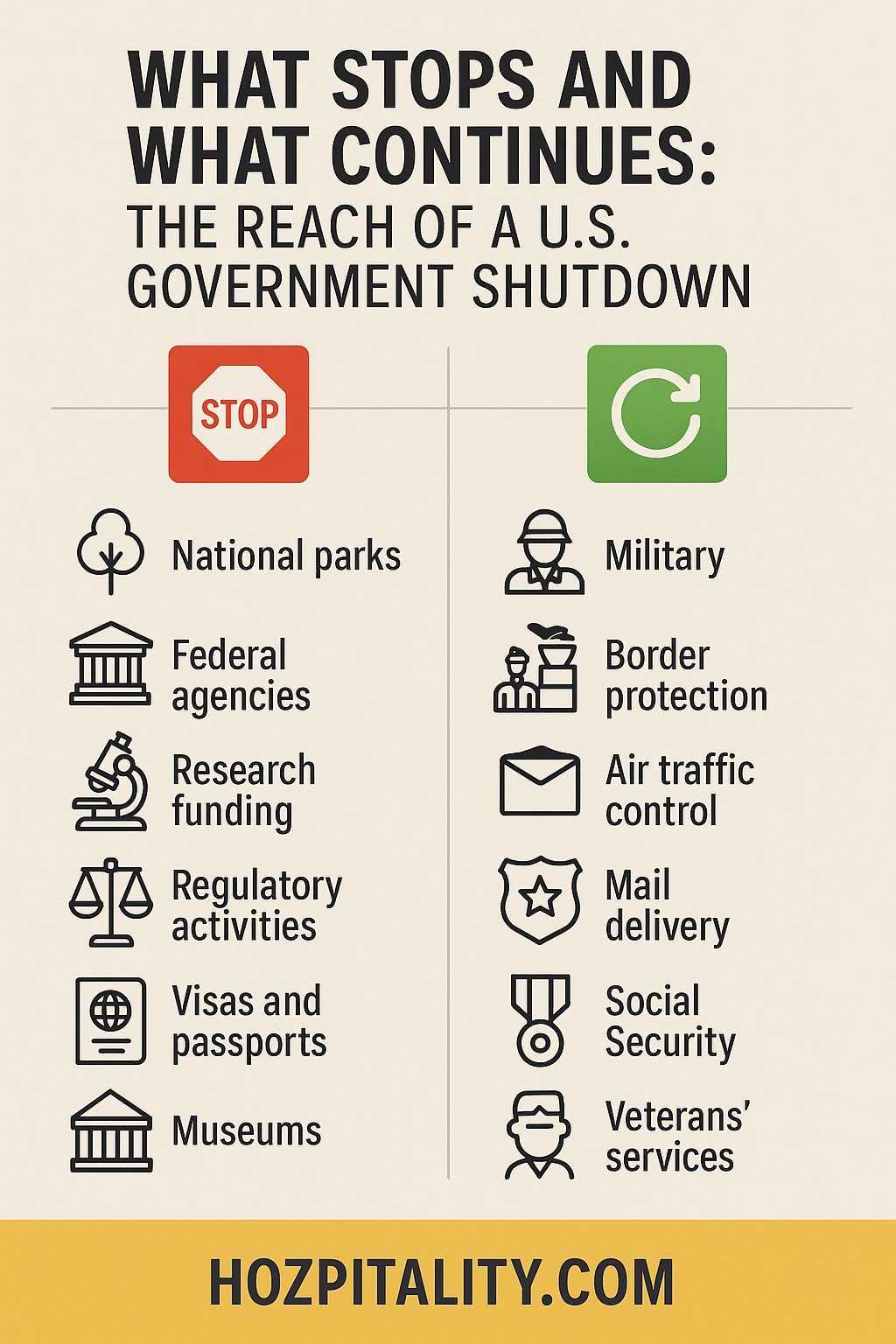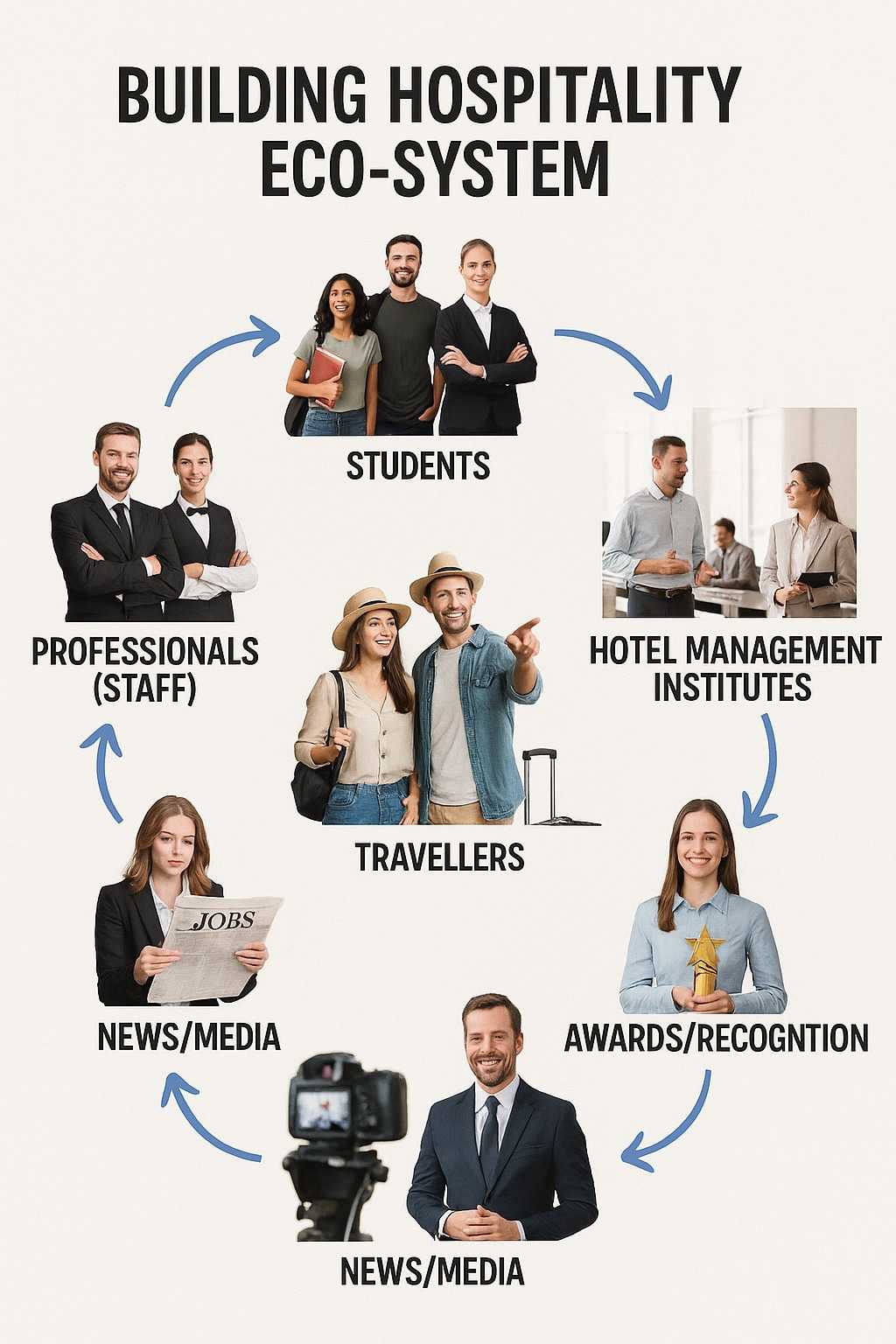The Hospitality Ripple Effect: Why the U.S. Government Shutdown is a Crisis at the Front Desk
The U.S. Travel Association estimates the shutdown will lead to a $1 billion reduction in economic activity across the American travel economy every week, and a substantial portion of that loss is absorbed directly by hospitality businesses.

The U.S. federal government shutdown may feel like a distant political drama, but for the hospitality industry, from hotels and city restaurants to visitor attractions, it represents a direct and significant economic disruption. As a core driver of tourism and leisure, the hospitality sector is highly exposed to the financial and logistical impacts caused by the lapse in federal funding in Washington.
The first, and most significant, consequence for our industry is a steep reduction in overall travel demand. The U.S. Travel Association estimates the shutdown will lead to a $1 billion reduction in economic activity across the American travel economy every week, and a substantial portion of that loss is absorbed directly by hospitality businesses. This impact is driven by two main factors: concrete service interruptions, such as the closure of National Parks and museums and the potential for air travel delays, and a decline in consumer confidence. These factors immediately translate into reduced bookings for hotels, lower foot traffic for restaurants in key destinations, and a noticeable softening in revenue per available room (RevPAR) across the country.
Furthermore, hospitality businesses in and around Washington D.C., as well as communities bordering federal lands, face a measurable decrease in patronage. Hundreds of thousands of federal employees and contractors, either furloughed or working without pay, adjust their spending, curtailing their daily purchases on lunch, coffee, and local services. For hotels and convention centers dependent on official government business travel, an essential client segment for many city market, the indefinite suspension of non-essential travel immediately impacts their schedules. For the hospitality sector, this shutdown is not merely an inconvenience; it is a measurable strain on operations that compounds with each passing day.
What Stops and What Continues: The Reach of the Shutdown
When the U.S. federal government enters a shutdown, as it has due to a lapse in funding, it is required to halt all "non-essential" discretionary functions. This means the impact is not uniform; critical services continue, often with an unpaid workforce, while many public-facing and regulatory functions cease entirely.
Here is a breakdown of the services most significantly affected and those that are structured to continue operating:
Services and Agencies That Are Largely Suspended (Furloughed Staff)
These departments and services rely on annual funding that has expired, leading to the furlough of most of their employees and the suspension of their non-essential activities:
-
National Parks and Federal Museums: Most of the nation's 400+ National Parks and federal sites (including the Smithsonian museums) are closed or have severely limited visitor access. Visitor centers, restrooms, and trash collection services often cease, leading to major disappointment for tourists and a loss of local tourism revenue.
-
Regulatory and Research Bodies: A significant majority of staff are furloughed at agencies dedicated to research, data collection, and regulation, including:
-
NASA: Non-essential research and development are put on hold.
-
Environmental Protection Agency (EPA): Routine inspections of hazardous waste sites, drinking water, and chemical facilities are suspended, potentially creating public health risks.
-
Department of Labor (DOL): Most operations, including the Bureau of Labor Statistics (BLS) reports, stop.
-
Department of Education: Processing of new grants and certain student aid support can be interrupted, though the core disbursement of student aid typically continues for a limited time.
-
-
IRS Customer Service: While the agency may recall staff to prepare for the upcoming tax season, general taxpayer assistance and non-essential functions like audits and processing of non-priority refunds are generally suspended.
-
Small Business Administration (SBA): The approval of new loans to small businesses stops.
-
Federal Judiciary: While the courts can operate for a short period using existing funds, a prolonged shutdown can lead to the furlough of thousands of judiciary employees and the postponement of non-essential civil litigation and administrative processes.
Services That Continue (Essential/Excepted Personnel)
Functions deemed necessary for national security, public safety, and those funded by non-annual or mandatory appropriations must continue. Employees in these roles are designated as "excepted" and work without pay until funding is restored:
-
Public Safety and Security:
-
Air Travel: Air traffic controllers (FAA) and Transportation Security Administration (TSA) officers remain on duty.
-
Law Enforcement: The Federal Bureau of Investigation (FBI), Coast Guard, Drug Enforcement Administration (DEA), and other federal law enforcement agencies remain operational.
-
Border Security: Customs and Border Protection (CBP) and Immigration and Customs Enforcement (ICE) agents continue to work, often with a focus on core enforcement.
-
Active-Duty Military: All active-duty military personnel are required to continue their service without immediate pay.
-
-
Entitlement Programs: Payments that are not subject to annual Congressional appropriation continue.
-
Social Security and Medicare: Monthly benefit payments are still issued. However, customer service, such as processing new Social Security card requests or benefit verification, may be delayed due to reduced administrative staff.
-
Veterans Affairs (VA): Veterans' health care services and benefits (compensation, pension, education) are generally processed and delivered.
-
-
Self-Funded Services:
-
U.S. Postal Service (USPS): Mail delivery continues as normal since the USPS is primarily funded by postage and service fees.
-
Passport and Visa Processing: These services, primarily funded by user fees, generally continue, though delays can occur if supporting staff are furloughed.
-
The key distinction remains whether an activity is classified as immediately necessary to "protect human life or property" or whether it is funded through mandatory programs versus the annual appropriations process. The longer the political impasse lasts, the more pronounced and severe the disruptions become across the full spectrum of government services.
The Wait for Resolution
The immediate financial damage to the travel sector, estimated by the U.S. Travel Association to be a billion per week, serves as a stark metric of the shutdown's economic toll. Beyond the cost, the uncertainty weighs heavily on hundreds of thousands of federal employees, from air traffic controllers to border agents, who are mandated to work without pay, putting the reliability of essential services under mounting pressure.
The ultimate duration and severity of the government shutdown remain subject to the political negotiations in Washington. Until a budget agreement or continuing resolution is passed by Congress, the nation will operate on a bifurcated system: core security and entitlement programs will continue under duress, while a wide array of research, public, and regulatory services remain suspended. The strain on both the economy and the federal workforce will only intensify with each passing day.
Sources and Further Reading
The analysis and data presented in this report were compiled from official federal agency contingency plans, expert commentary, and current press reporting. Key economic data is specifically attributed to the following organizations:
-
U.S. Travel Association: For the estimated economic impact on the travel industry.
-
Federal Aviation Administration (FAA) and Transportation Security Administration (TSA) Official Guidance: For details regarding the operational status of "excepted" personnel in air travel.
-
Congressional Budget Office (CBO) and News Analysis: For figures on furloughed federal employees and the historical impact of past shutdowns.








